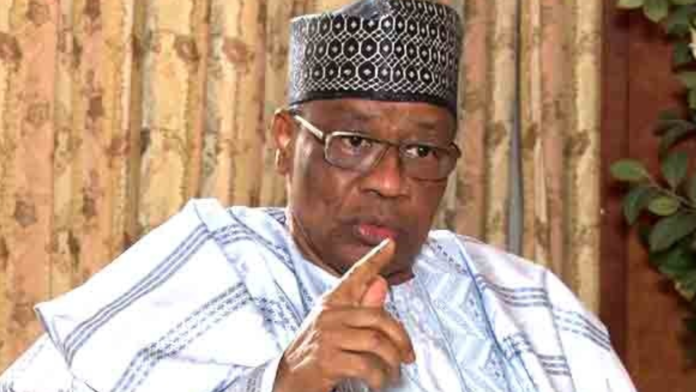The former Head of State, General Ibrahim Babangida (retd.), has revealed details of the foiled coup allegedly led by his childhood friend, General Mamman Vatsa, which he says compelled him to choose between preserving a longstanding personal bond and safeguarding the nation’s future.
In excerpts from his autobiography, “A Journey of Service,” launched on February 20, 2025, Babangida recounts how early warnings about Vatsa’s alleged plans reached him “as a series of rumours.”
In Chapter 10 titled, “The Challenges of Leadership,” the former military leader said though he initially dismissed the rumours as unfounded jealousy of the close relationship they both shared since their youth, he consulted fellow officers, including Generals Nasko, Garba Duba, and Wushishi.
Subsequent covert investigations by military and other intelligence agencies, he explained, uncovered “incontrovertible evidence” that Vatsa had funded officers to facilitate the plot.
Babangida said, “With our experience in the few months in government and the benefit of hindsight based on previous rumours, I determined that the best way to tackle the rumours about a possible Vatsa coup was by confronting the principal suspects.
“When the decibel of the stories rose too high, I confronted Vatsa himself after reporting the rumours to more senior colleagues like Generals Nasko, Garba Duba and Wushishi. Nasko intervened and tried to find out the truth from Vatsa. Vatsa flatly denied it all, but the covert investigations by the military and other intelligence services continued.
“Once substantial incontrovertible evidence was established, the arrests began. It turned out that Vatsa had paid several officers money to facilitate the coup operation. One of them was Lt-Col. Musa Bitiyong, who was given N50,000.
“He admitted it, and Vatsa also admitted the payment but said he wanted to help Bitiyong establish a farm project — the case of Lt-Col. Musa was not helped because he had previously been involved in other controversial coup stories.”
Among the reported plans were the bombing of the Eko Bridge in Lagos and the sabotage of key Air Force assets.
Referring to the scheme as “dastardly,” he said intelligence revealed plans to hijack or shoot down the presidential aircraft.
“I felt a deep personal sense of betrayal,” he noted, citing their decades-long friendship that began in Minna.
Once the military tribunal completed its review, Babangida said, “it was clear that the coup planners had to be executed.”
Vatsa and nine other co-conspirators were executed in March 1986, a decision Babangida called “a personal loss of a childhood friend” but one necessary to secure Nigeria’s stability.
He wrote, “They had planned a bloody coup which would have plunged the country into darkness. I had to choose between saving a friend’s life and the nation’s future.
“Above all, everyone who had signed on to a military career understood clearly what it meant to plan a coup and fail. The penalty was clear and unmistakable.”
Reflecting on the emotional toll, Babangida described being “somewhat depressed” over Vatsa’s death yet insisted his responsibility to uphold national security took precedence over personal ties.
“Of course, Vatsa’s death was a personal loss of a childhood friend. As a human being, I was somewhat depressed to watch him die in such circumstances.
“However, the nation’s stability and the cohesion of the armed forces were too high on the scale of priorities to be sacrificed for personal considerations. The law and the imperatives of order and national security are overriding.
“Everyone who had signed on to a military career understood clearly what it meant to plan a coup and fail,” he said.
According to him, members of Vatsa’s family and various political interests later attempted to politicise the episode, but he remained resolute that the execution was vital for “the cohesion of the armed forces” and the country as a whole.
In his account, Babangida noted that some senior officers had expressed dissatisfaction about Vatsa’s appointment as Minister of the Federal Capital Territory, mainly because the latter played no role in removing General Buhari.
Nonetheless, the former Head of State said he “remained true” to their friendship and “bent backwards to accommodate his excesses and boisterousness.”
Speaking at the official launch of his autobiography and fundraiser for the IBB Presidential Library in Abuja, Babangida expressed regret over the annulment of the June 12, 1993, presidential election, acknowledging that the candidate of the Social Democratic Party, Moshood Abiola, won the elections.
However, he blamed “forces” led by former Head of State, General Sani Abacha, for annulling the elections.
In the 12th chapter of the book subtitled, ‘Transition to civil rule and the June 12 Saga, he wrote, “I remember saying: ‘These nefarious ‘inside’ forces opposed to the elections have outflanked me!’
“I would later find out that the ‘forces’ led by General Sani Abacha annulled the elections.
“There and then, I knew I was caught between the devil and the deep blue sea!! From then on, the June 12 elections took on a painful twist for which, as I will show later, I regrettably took responsibility.”
He also said the annulment was to avoid a foreseen elimination of Abiola, which would plunge the nation into a civil war.
“While I accept that the unfortunate denial of his mandate amounted to a subversion of the will of the Nigerian people, I was petrified that if Abiola got killed, it could lead to a civil war. Having participated in one civil war, with all its horrors, pains and devastation, I wasn’t prepared to see another,” he wrote on page 287.
(The PUNCH)



